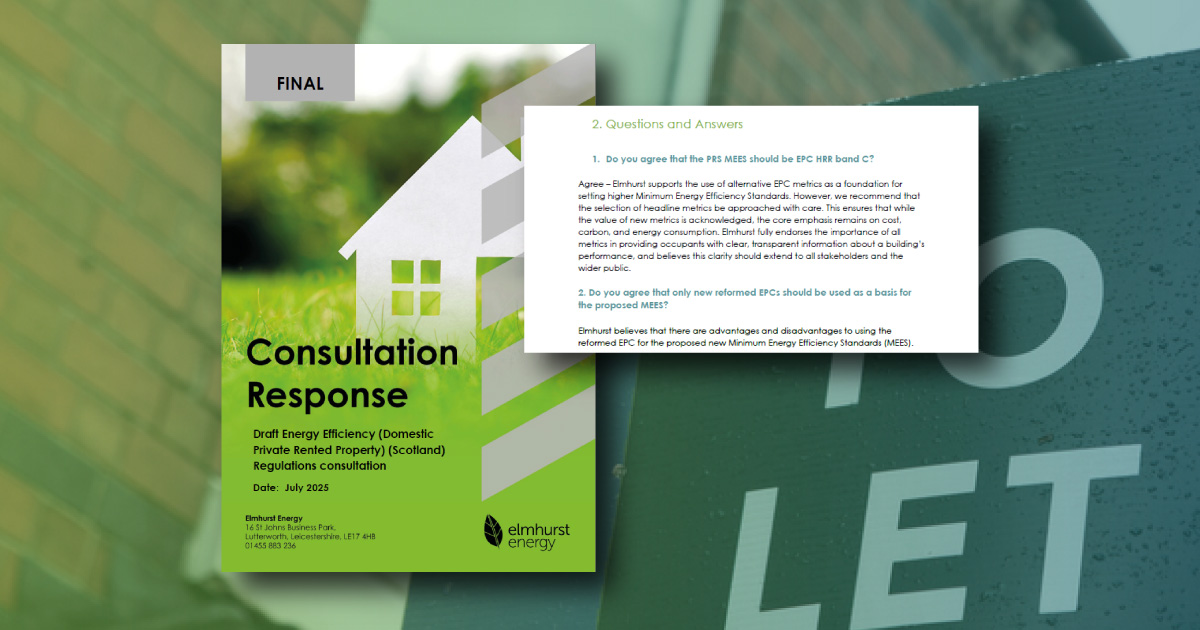Elmhurst Responds to Scottish Consultation on MEES for Domestic Private Rented Sector
On 6 June 2025, the Scottish Government published a consultation on proposals to introduce a minimum energy efficiency standard for privately rented homes in Scotland. The consultation closed on 29 August 2025, and Elmhurst Energy were pleased to respond on behalf of their members.
What does the Consultation cover?
The consultation outlines plans to introduce MEES regulations for domestic PRS properties under powers from the Energy Act 2011. These proposals aim to improve energy efficiency, reduce fuel poverty, and support Scotland’s net-zero targets by requiring privately rented homes to meet a minimum EPC Heat Retention Rating (HRR) of Band C. The regulations would apply:
- From 2028 for new tenancies
- By 2033 for all PRS properties
This builds on previous efforts, including draft regulations from 2019 that were withdrawn due to the pandemic. The consultation seeks stakeholder input to refine the proposals and ensure practical implementation. The areas covered in the consultation include:
- EPC HRR Band C Requirement
- Phased Implementation Timeline
- Proposed cost cap of £10,000 per property
- Financial penalties suggested, with potential increases up to £30,000 for non-compliance.
- Exemptions may apply for:
- Consent issues (e.g. planning restrictions)
- Fabric limitations
- Temporary exemptions supported by HEETSA assessments
Elmhurst’s Response Summary
A summary of the key responses that Elmhurst has submitted to the consultation are as follows:
Support for MEES Framework with Emphasis on Fairness and Clarity
Elmhurst Energy expresses strong support for the introduction of Minimum Energy Efficiency Standards (MEES) in the private rented sector, particularly the use of EPC Heat Retention Rating Band C as the regulatory benchmark. Our response emphasises the importance of fairness in implementation, advocating for clear communication of requirements, updated EPCs to reflect current standards, and a phased timeline that allows landlords to prepare adequately. Transparency in how metrics are presented to landlords and tenants is seen as essential to building trust and ensuring compliance.
Financial Support and Cost Cap Considerations
The response highlights broad support for the proposed £10,000 cost cap, which should include the cost of EPC assessments and qualifying improvement works. Elmhurst recommends that improvements made within a 12-month lead-in period should count toward this cap, encouraging early action. We also ask the Scottish Government to offer a diverse range of financial support mechanisms beyond loans, such as grants and incentives, to ensure that landlords with varying financial circumstances can meet the new standards without undue hardship.
Sensible Exemptions and Practical Implementation
Elmhurst agrees with the proposed exemptions, including those based on consent issues, fabric limitations, and temporary circumstances. However, we stress that these exemptions must be grounded in robust, evidence-based criteria and subject to regular review. While Elmhurst endorse local authorities as the enforcement body, we caution that adequate funding and training will be critical to ensure consistent and effective enforcement across Scotland.
Following communication with Elmhurst members on 11th August, linking to our draft consultation response, we have now collated the feedback and have submitted our final response to the consultation.
Read Full Consultation Response
To read Elmhurst’s full response to the Scotland consultation on proposals to introduce a minimum energy efficiency standard for privately rented homes, please click the button below.
READ NOW >
